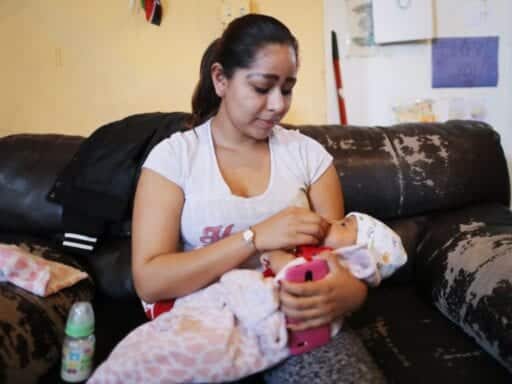“People will die because of this,” a State Department official told Vox.
The State Department has told US embassies across the world to deny visas to women they suspect are coming to the US to give birth, according to diplomatic cables obtained by Vox — guidance that gives broad discretion to consular officers and could prove dangerous to pregnant women seeking medical care.
The cable, sent Wednesday afternoon and marked “sensitive but unclassified,” turns a suspicion among immigration restrictionists that women are trying to game America’s visa system into official US policy starting on January 24. The apparent goal is to clamp down on foreigners giving birth to children in the US who become, by birth, American citizens.
A draft of the State Department guidance was first reported by BuzzFeed on Tuesday.
The guidance would create new barriers for pregnant women at consulates abroad applying for B visas, which are offered to short-term visitors, including tourists, business travelers, and people seeking urgent medical care.
The government does not track how many pregnant women come to the US on B visas, but 2017 data from the Centers for Disease Control and Prevention suggests that the new guidance would likely affect roughly 10,000 women annually.
According to one State Department official, pregnant women applying for these kinds of visas may not receive the kind of care they need in their home country or have the money to get better care in the US.
“People will die because of this,” the official, who spoke on the condition of anonymity to discuss a sensitive matter, told Vox.
Secretary of State Mike Pompeo signed off on the cable, drafted by a staffer who works on consular affairs. The State Department didn’t immediately return a request for comment.
Pregnant women will face new scrutiny when applying for visas
According to the cable, a US consular officer can’t ask a visa applicant if they are pregnant or intend to become pregnant. However, “if you have reason to believe the applicant will give birth during their stay in the United States, you are required to presume that giving birth for the purpose of obtaining U.S. citizenship is the applicant’s primary purpose of travel,” the cable reads.
An applicant can overcome that suspicion, according to the cable, if they demonstrate “a different and permissible primary purpose of travel,” including having already arranged for specialized medical treatment in the US. But even then that might not be enough.
“The fact that an applicant has an arranged birth plan with a doctor or medical facility in the United States or simply expresses a preference to give birth in the United States over other locations is not sufficient to rebut the presumption that their primary purpose of travel is obtaining U.S. citizenship for the child,” reads the cable. “One key factor you should consider is whether the applicant has access to reasonable medical care in or near the country where the applicant resides.”
The cable also says that a visa applicant “seeking medical treatment in the United States must demonstrate to the consular officer’s satisfaction that they have both the means and the intent to pay for all treatment-related costs.”
If a person can’t show they have the funds — a judgment ultimately made by consular officers, who are not experts in the cost of health care — it’s possible they will have their request rejected.
Subverting birthright citizenship — the constitutional guarantee to all children born in America, regardless of their parents’ nationality — has long been a goal for some of the Trump administration’s immigration hawks, including White House senior adviser Stephen Miller.
There are about 4.1 million children who are US citizens and have unauthorized immigrant parents living in the US, according to the Migration Policy Institute, a nonpartisan think tank. But in the vast majority of cases, their mothers became pregnant after their arrival in the US: About 90 percent of noncitizen mothers with US-citizen children gave birth at least two years after coming to the US, according to a 2011 study by the Pew Research Center.
But rather than immediately try to take on birthright citizenship head on, the State Department cable suggests, the Trump administration is trying to stop women who might give birth in the US from entering in the first place.
Author: Alex Ward
Read More



